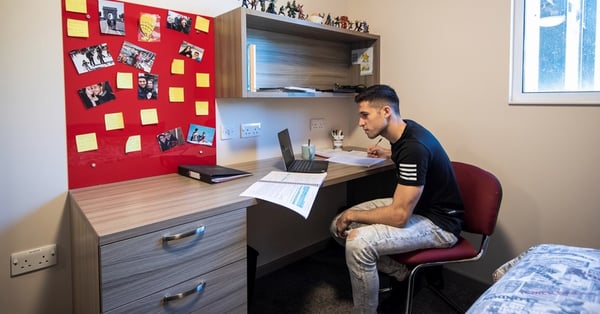Getting a job while at university is a fantastic opportunity to learn something new, earn some money and develop your confidence. But you might feel tired after work and unable to study which can affect how productive you are. What you need to do is learn the best ways to find the time, energy and motivation to study when you get home.

Here are five tips on how to study after a long day at work.
- Make a study plan
- Know what to focus on
- Eat healthily and get a good night’s sleep
- Put your phone down
- Use your free time wisely
1. Make a study plan
There are both advantages and disadvantages to working while studying. You’ll be able to learn a lot, meet new people and gain new skills but you also might have less time to spend with friends. A lot of the disadvantages can be avoided if you make a study plan and stick to it.
Creating a study plan is simple. All you need to do is make a weekly calendar and then mark the hours you’re at work and the hours you’re in university lectures. The free time you have left can be split into sections which you can use to study. By splitting up your time into small pieces, you can study more often and with more energy.
Using your study plan means you can effectively plan your weeks in advance, so you can manage your time better and be prepared for any future work.
2. Know what to focus on
When creating a study plan, you also need to know what to focus on. Sitting to study without a plan can be a waste of time.
Before you start to work, get out all the equipment or books you need and have a topic of focus for the study session. It could be what you learned in your lecture yesterday or focused on an essay you’re currently writing.
You can even write in your diary what to focus on which will help keep you on track. You could do this every morning or at the weekend so you’re prepared for the entire week ahead.
3. Eat healthily and get a good night’s sleep
To study and work while at university, you need energy. To gain the most amount of energy you need to have a healthy diet and get a good night’s sleep.
A good diet is a balanced diet. Full of protein, carbohydrates and vitamins from fresh fruit and vegetables. Cooking food at university is easy. Newcastle University has a mixture of catered and self-catered student flats where you can eat in canteens or cook for yourself. If you are cooking for yourself, make sure you’re writing a shopping list for your weekly meals so you know what to prepare.
But it’s OK to treat yourself every now and then by eating out or purchasing a takeaway meal.
Sleep is also really important. If you’re not getting a good amount of quality sleep, your body won’t have enough energy to have a successful day when at work or university. To get a good night’s sleep, make sure you put your phone on silent before you go to bed because it can be a distraction. Also, try not to drink any coffee or caffeine-filled drinks late at night.
You can also set yourself a time to go to bed each night and an alarm for the morning. This helps to make getting a good night’s sleep an easy habit.
4. Turn off your technology
When you return from work, it might be tempting to go on your phone or watch television. While this is relaxing, it’s easy to forget you have to study too.
When you get home, take some time to relax. Make a hot drink or eat a snack and then head up to your room to study. It’s good to release any stress you may have experienced during work so you’re in a good mood to study.
If you need your laptop to study, make sure you’re not using social media or streaming websites because these will also distract you from a productive evening.
If you can focus more on studying with a little sound, turn on some music, the radio, podcasts or even Netflix in the background without being distracted.
5. Use your free time wisely
As a student, you’ll have free time in the evenings, at weekends, in the mornings and even during your time using public transport. It’s good to split these times up so that you can decide how you’ll use them to study.
If you wake up early enough, you’ll be able to do some light studying for at least an hour before work. While you’re using public transport, you can read some of your key texts or practice remembering facts.
You should also remember when to stop studying. If you do too much, there’s a chance you could begin suffering from stress and find your mental health is affected. This is easily prevented - you need to have a healthy balance between studying and other activities such as spending time with friends.
Having good mental wellbeing is another important requirement for learning how to study after a long day at work. So how can you maintain good physical and mental wellbeing while at university?
Stay mentally healthy while at university
If you’re going to university or already studying there, you need to maintain good mental health. Having good mental health makes it so much easier to study and enjoy your time in the UK. At Newcastle University, we offer free and confidential health and wellbeing support to all students.